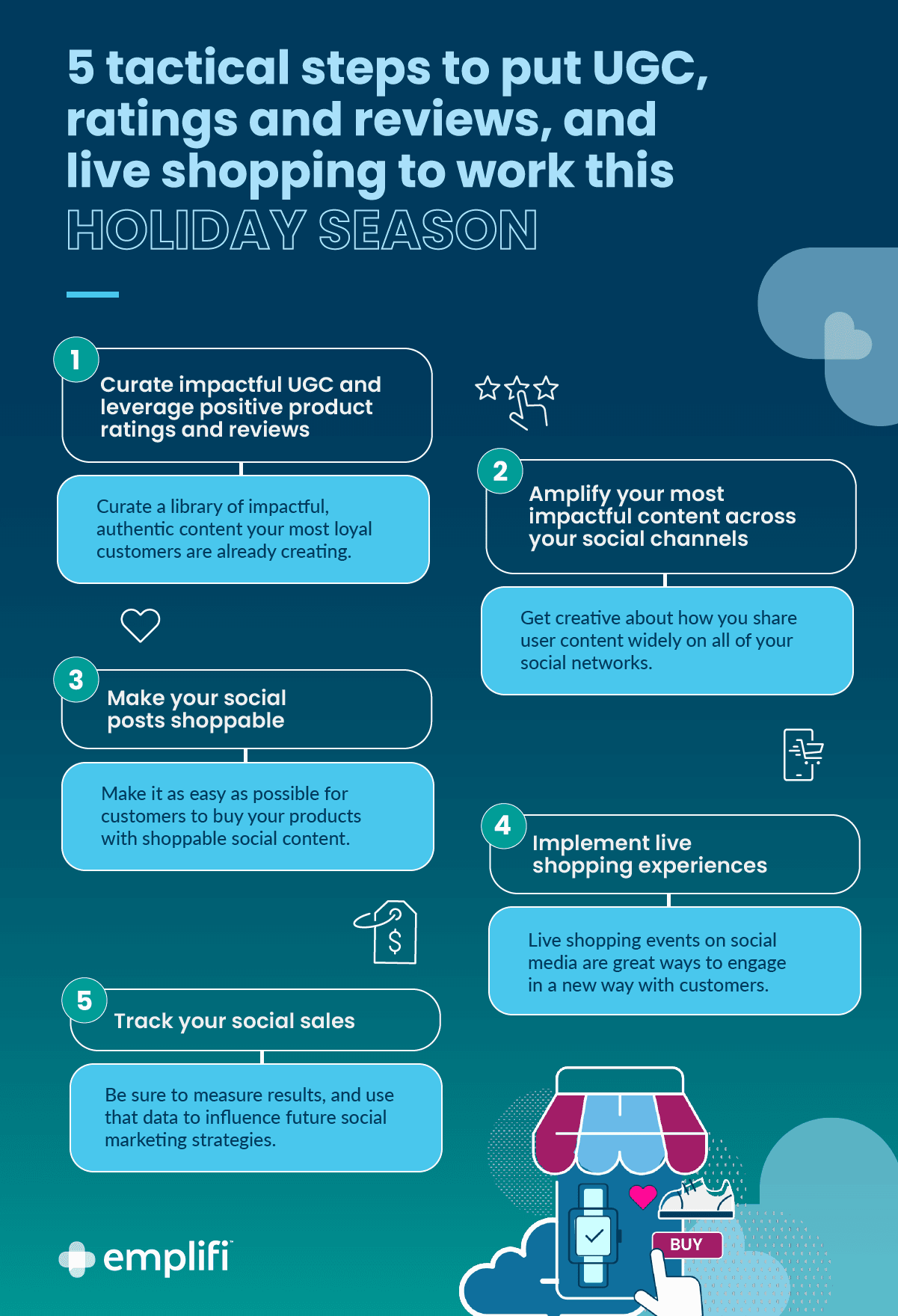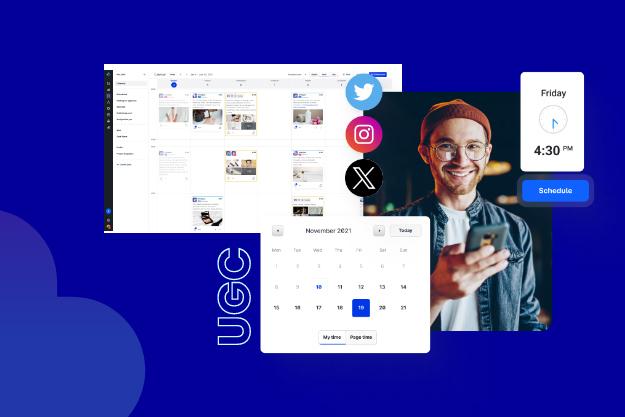One thing brands and retailers can count on this holiday season is that shoppers are being more frugal when it comes to buying gifts. A recent survey of more than 2,000 consumers revealed over half won’t be able to buy as many gifts as last season, with more than a quarter of the respondents claiming they plan to limit how much they spend. This means brands will need to be more strategic with their eCommerce initiatives and potentially explore new ways to meet their end-of-year revenue goals.
A primary question brands are facing right now: How can they gain a competitive edge without drastically increasing their marketing spend? By implementing a comprehensive social commerce strategy, marketers can move the needle on their brand’s most important holiday goals, including increased revenue and new customer acquisition.
Social commerce is full of untapped opportunities, but brands need to be strategic and develop impactful campaigns that make it easy for customers to find and buy products on their preferred social platforms. The good news is that most brands already have all the components of a winning social commerce strategy — user-generated content (UGC), ratings and reviews, and live shopping capabilities.
Here are five tactical steps brands and retailers can take now to help them reach their end-of-year revenue goals.
Step 1: Curate impactful UGC and leverage positive product ratings and reviews
The upside to UGC and customer ratings and reviews is that it’s readily available if you have products your audience already loves.
The reality is that consumers want authentic interactions with brands — UGC, ratings, and reviews offer a level of authenticity you don’t get from other marketing content. In fact, a recent Emplifi study based on a survey conducted in collaboration with Harris Interactive revealed that 71% of consumers say “authentic” positive user reviews make a difference in purchasing decisions, and more than half of online shoppers seek out pictures and videos of a product posted by real people before buying it.
By identifying UGC, ratings, and reviews that put your brand and products in the best light possible, you can curate an entire library of impactful content that can be leveraged across your marketing platforms.
Step 2: Amplify your most impactful content across your social channels
Once you’ve identified impactful UGC, ratings, and reviews, use them to create social media marketing content across your brand’s social channels. Developing this type of content doesn’t take a heavy lift from your social media marketing team. Often, the UGC is ready to go once you have the creator’s approval to leverage within your marketing efforts.
Because ratings and reviews usually don’t include images or videos, you may need to get more creative in how you leverage this content. One example: Using screenshots of a positive review within an Instagram Reel, Snapchat Story, or as part of a TikTok ad can add an extra layer of authenticity, giving consumers the exact content they want when researching a product.
Step 3: Make your social posts shoppable
It seems simple, but one of the most strategic things you can do to boost your eCommerce results is to make your product easy to buy. What could be more seamless than creating shoppable social media posts from UGC? Not only are you giving your audience the exact content they crave — authentic storytelling about your brand told by real people — but you’re also offering a quick and easy way for them to make the purchase.
Shoppable social posts are the cornerstone of social commerce. Fortunately for brands, social platforms make it easy to integrate shoppable links within branded content:
Both Facebook and Instagram have shopping features that allow brands to tag products so that consumers can make a purchase within the app.
TikTok has three different types of shoppable ads within the “Product Sales” campaign objective in the TikTok Ads Manager: Video Shopping Ads, Live Shopping Ads, and Product Shopping Ads.
Pinterest, Snapchat, and X (formerly Twitter) also offer brands native features within their advertising platforms to create shoppable posts.
Step 4: Implement live shopping experiences
Live shopping experiences can greatly boost a brand’s social commerce efforts, especially for high-priced items or products that usually include extra consideration by the buyer. By offering a live shopping event, brands give shoppers the opportunity to ask questions about a product and get whatever information they need before making a purchase. Live commerce events also give brands an opportunity to upsell a transaction with a live agent or personal shopper who can offer suggestions on accessories or other complementary items.
One-to-many live shopping experiences, where multiple people log in to watch the event, are a strategic way to leverage influencers and high-profile celebrities within your social commerce initiatives. Imagine someone your audience admires and follows emceeing a Facebook Live event highlighting your best-selling products.
Ultimately, live shopping experiences enable brands and retailers to provide a high-touch, personalized online shopping experience that offers increased levels of flexibility and convenience for consumers. It helps generate revenue while boosting brand loyalty among your most lucrative shoppers.
Step 5: Track your social sales
In the world of social media marketing, did a campaign even happen if you don’t track it? Because social commerce is directly tied to revenue, you must keep track of how much revenue you generated, which products were sold via shoppable posts, and which posts generated the most sales. Monitoring social commerce KPIs is key to understanding what content best resonates with your audience.
The insights you gain can then be used outside your social commerce strategy, informing future social media marketing campaigns and key messaging points for traditional and digital marketing efforts. For example, images from a shoppable post with extraordinarily high engagement may be leveraged on your website or product pages — or even used for in-store graphics.
Social commerce is the future of retail
From a business side, one of the best things about leveraging UGC and customer ratings and reviews is that it is extremely cost-effective. Even live shopping events can be hosted using native tools already built into social platforms. The overhead cost to develop and implement these efforts is minimal; it just takes time to identify the content you want to amplify and then build out the campaign using the social platform’s shopping features.
There are no added creative costs in designing ads that require multiple sign-offs from internal stakeholders. Instead, you’re leveraging the very content consumers want: authentic messaging from real people who have used – and love – your products. It’s a win-win for everyone: the brand and the consumer.
Industry analysts predict U.S. social commerce retail sales will surpass $45 billion by the end of 2023, and will likely grow by nearly 20% in the next two years. As shoppers get more comfortable making purchases on their favorite social media platforms, social commerce will become more integral to a brand’s eCommerce strategies.
By entering the game now and implementing a social commerce strategy that leverages your brand’s most impactful content, you’re creating a clear pathway to eCommerce success in the years to come.





































